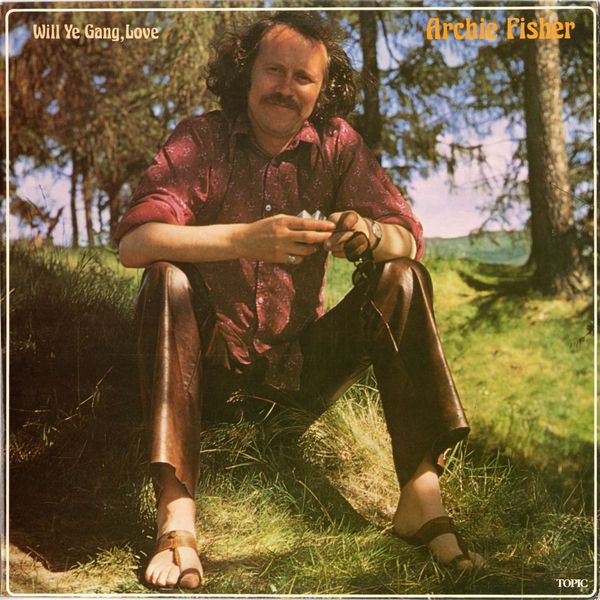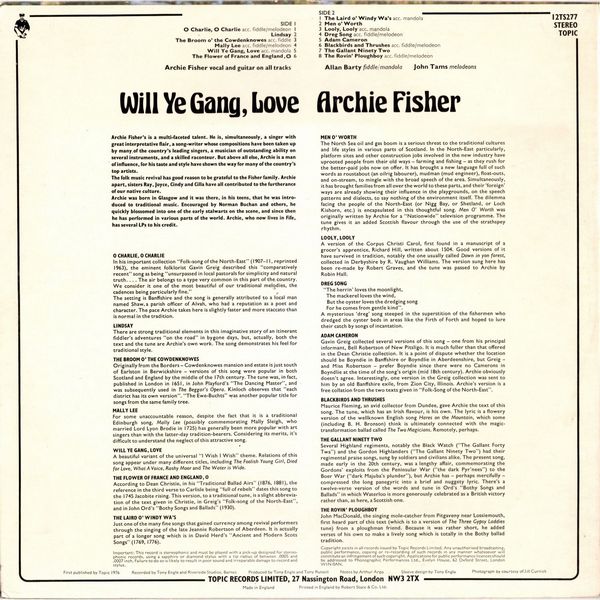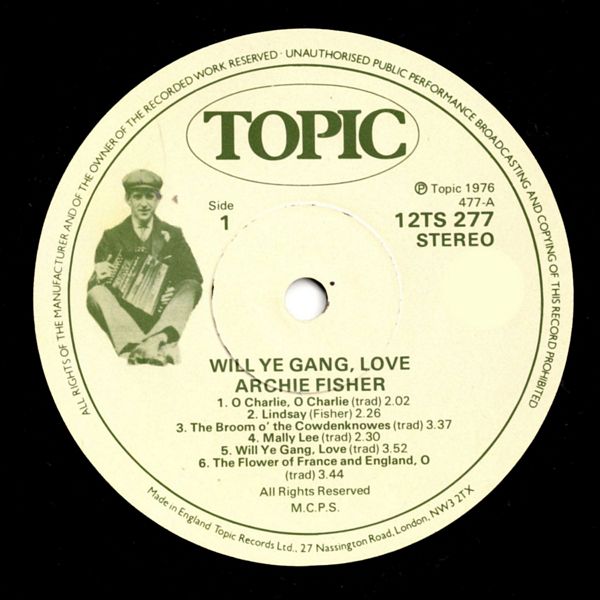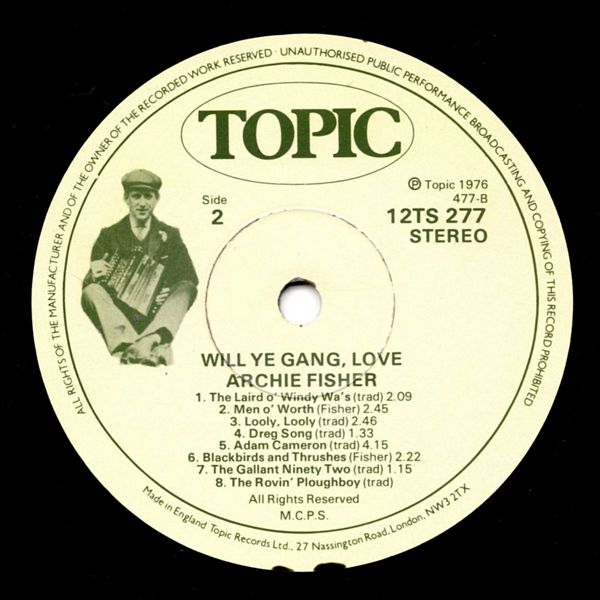

 |



|
Sleeve Notes
Archie Fisher's is a multi-faceted talent. He is, simultaneously, a singer with great interpretative flair, a song-writer whose compositions have been taken up by many of the country's leading singers, a musician of outstanding ability on several instruments, and a skilled raconteur. But above all else, Archie is a man of influence, for his taste and style have shown the way for many of the country's top artists.
The folk music revival has good reason to be grateful to the Fisher family. Archie apart, sisters Ray, Joyce, Cindy and Cilia have all contributed to the furtherance of our native culture. Archie was born in Glasgow and it was there, in his teens, that he was introduced to traditional music. Encouraged by Norman Buchan and others, he quickly blossomed into one of the early stalwarts on the scene, and since then he has performed in various parts of the world. Archie, who now lives in Fife, has several LPs to his credit.
O Charlie, O Charlie — In his important collection "Folk-song of the North-East" 1907-11, reprinted 1963), the eminent folklorist Gavin Greig described this "comparatively recent" song as being "unsurpassed in local pastorals for simplicity and natural truth. . . . The air belongs to a type very common in this part of the country. We consider it one of the most beautiful of our traditional melodies, the cadences being particularly fine." The setting is Banffshire and the song is generally attributed to a local man named Shaw, a parish officer of Alvah, who had a reputation as a poet and character. The pace Archie takes here is slightly faster and more staccato than is normal in the tradition.
Lindsay — There are strong traditional elements in this imaginative story of an itinerant fiddler's adventures "on the road" in bygone days, but, actually, both the text and the tune are Archie's own work. The song demonstrates his feel for traditional style.
The Broom O' The Cowdenknowes — Originally from the Borders — Cowdenknowes mansion and estate is just south of Earlston in Berwickshire — versions of this song were popular in both Scotland and England by the middle of the 17th century. The tune was, in fact, published in London in 1651, in John Playford's "The Dancing Master", and was subsequently used in The Beggar's Opera. Kinloch observes that "each district has its own version". "The Ewe-Buchts" was another popular title for songs from the same family tree.
Mally Lee — For some unaccountable reason, despite the fact that it is a traditional Edinburgh song, Mally Lee possibly commemorating Mally Sleigh, who married Lord Lyon Brodie in 1725) has generally been more popular with art singers than with the latter-day tradition-bearers. Considering its merits, it's difficult to understand the neglect of this attractive song.
Will Ye Gang, Love — A beautiful variant of the universal "I Wish I Wish" theme. Relations of this song appear under many different titles, including The Foolish Young Girl, Died for Love, What A Voice, Rashy Moor and The Water is Wide.
The Flower of France and England, O — According to Dean Christie, in his "Traditional Ballad Airs" 1876, 1881), the reference in the third verse to Carlisle being "full of rebels" dates this song to the 1745 Jacobite rising. This version, to a traditional tune, is a slight abbreviation of the text given in Christie, in Greig's "Folk-song of the North-East", and in John Ord's "Bothy Songs and Ballads" 1930).
The Laird O' Windy Wa's — Just one of the many fine songs that gained currency among revival performers through the singing of the late Jeannie Robertson of Aberdeen. It is actually part of a longer song which is in David Herd's "Ancient and Modern Scots Songs" 1769, 1776).
Men O'Worth — The North Sea oil and gas boom is a serious threat to the traditional cultures and life styles in various parts of Scotland. In the North-East particularly, platform sites and other construction jobs involved in the new industry have uprooted people from their old ways — farming and fishing — as they rush for the better-paid jobs now on offer. It has brought a new language full of such words as roustabout an oil rig labourer), mudman mud engineer), float-outs, and on-stream, to mingle with the broad speech of the area. Simultaneously, it has brought families from all over the world to these parts, and their 'foreign' ways are already showing their influence in the playgrounds, on the speech patterns and dialects, to say nothing of the environment itself. The dilemma facing the people of the North-East or Nigg Bay, or Shetland, or Loch Kishorn, etc.) is encapsulated in this thoughtful song. Men O' Worth was originally written by Archie for a "Nationwide" television programme. The tune gives it an added Scottish flavour through the use of the strathspey rhythm.
Looly, Looly — A version of the Corpus Christi Carol, first found in a manuscript of a grocer's apprentice, Richard Hill, written about 1504. Good versions of it have survived in tradition, notably the one usually called Down in yon forest, collected in Derbyshire by R. Vaughan Williams. The version sung here has been re-made by Robert Graves, and the tune was passed to Archie by Robin Hall.
Dreg Song — "The herrin' loves the moonlight,
The mackerel loves the wind,
But the oyster loves the dredging song
For he comes from gentle kind".
A mysterious 'dreg' song steeped in the superstition of the fishermen who dredged the oyster beds in areas like the Firth of Forth and hoped to lure their catch by songs of incantation.
Adam Cameron — Gavin Greig collected several versions of this song — one from his principal informant, Bell Robertson of New Pitsligo. It is much fuller than that offered in the Dean Christie collection. It is a point of dispute whether the location should be Boyndie in Banffshire or Boyndlie in Aberdeenshire, but Greig — and Miss Robertson — prefer Boyndie since there were no Camerons in Boyndlie at the time of the song's origin mid 18th century). Archie obviously doesn't agree. Interestingly, one version in the Greig collection was sent to him by an old Banffshire exile, from Zion City, Illinois. Archie's version is a free collation from the two texts given in "Folk-Song of the North-East".
Blackbirds and Thrushes — Maurice Fleming, an avid collector from Dundee, gave Archie the text of this song. The tune, which has an Irish flavour, is his own. The lyric is a flowery version of the wellknown English song Hares on the Mountain, which some including B. H. Bronson) think is ultimately connected with the magic-transformation ballad called The Two Magicians. Remotely, perhaps.
The Gallant Ninety Two — Several Highland regiments, notably the Black Watch "The Gallant Forty Twa") and the Gordon Highlanders "The Gallant Ninety Two") had their regimental praise songs, sung by soldiers and civilians alike. The present song, made early in the 20th century, was a lengthy affair, commemorating the Gordons' exploits from the Peninsular War "the dark Pyr'nees") to the Boer War "dark Majuba's plunder"), but Archie has — perhaps mercifully — compressed the long panegyric into a brief and nuggety lyric. There's a twelve-verse version of the words and tune in Ord's "Bothy Songs and Ballads" in which Waterloo is more generously celebrated as a British victory rather than, as here, a Scottish one.
The Rovin' Ploughboy — John MacDonald, the singing mole-catcher from Pitgaveny near Lossiemouth, first heard part of this text which is to a version of The Three Gypsy Laddies tune) from a ploughman friend. Because it was rather short, he added verses of his own to make a lively song which is totally in the Bothy ballad tradition.